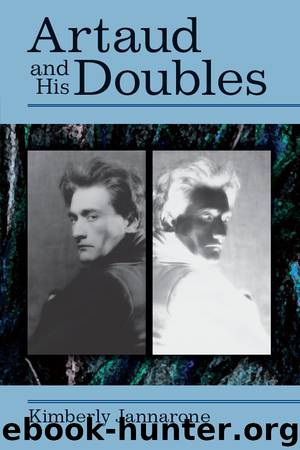Artaud and His Doubles by Jannarone Kimberly;

Author:Jannarone, Kimberly;
Language: eng
Format: epub
Publisher: University of Michigan Press
The Nerve Meter
Artaud's wish to treat the spectators like snake charmers’ subjects, to throw the audience into trances and orchestrate every breath, emotion, and act in the theatrical event, is an aspiration not to awaken the individual but to transmit a vision directly into another human being.17 This idea occurs early in Artaud's oeuvre: in a 1925 poem, he articulates a communicative fantasy that would bypass all the imperfections of language, works, and separation: “Le Pèse-Nerfs”—“The Nerve Meter”:
And I have already told you: no works, no language, no words, no mind, nothing.
Nothing but a fine Nerve Meter.
A kind of incomprehensible stopping place in the mind [l'esprit], right in the middle of everything. (SW, 86)
The Nerve Meter connects people on the most essential level, one that is both and neither physical and spiritual. It is not logical or even definable; it transcends understanding. The Meter would replace all discrete entities and actions with pure being.
Artaud's Nerve Meter rests on the idea of nerves of different organisms being in absolute sympathy with one another, across space, time, and matter. It calls to mind that blurred boundary between the will and the body, which, as we have seen, was so strongly in evidence in the between-wars resurgence of hostility toward rationalist science. In particular, the Nerve Meter poetically re-envisions the idea of animal magnetism, or Mesmerism, which had been popular, in different forms, in the late eighteenth and nineteenth centuries. Mesmerism was the belief that being was composed of “animated matter.” It rested on an underlying conception of the identity of the physical, mental, and spiritual realms. The theory of animal magnetism purported that animated matter could be manipulated by one person—the Mesmerist—who had comprehended the co-existence of these realms and thus harnessed the power to control them. The practice of Mesmerism itself, the production of phenomena by the “physical force or subtle organic emission from one body into another,” provides us with a way to envision Artaud's call to “directly affec[t] the organism” (TD, 81).18 It can easily stand with the Nerve Meter as an image for how the Theater of Cruelty would operate in three aspects: the image of being, that is, the identity of physical, mental, and spiritual realms; the unified totality (via the loss of the self) it demands; and the element of absolute control by one exceptional person that this view makes possible.
The Nerve Meter posits the simultaneous transfer from one person to another of will, physical forces, and a more ineffable life force. It conflates all levels of being and blurs lines between the material and immaterial. It is “incomprehensible” because it operates outside of these categories, or, more precisely, encompasses them; it is all categories. The Meter represents the dissolution into pure being. To communicate via the Nerve Meter would be to bypass any perceived distinction between the mental and the physical, as well as between the self and the other.
The ultimate end of this kind of dissolution can be seen as enrapturing or terrifying. Artaud's vision is to return us to a primordial sludge.
Download
This site does not store any files on its server. We only index and link to content provided by other sites. Please contact the content providers to delete copyright contents if any and email us, we'll remove relevant links or contents immediately.
| African | Asian |
| Australian & Oceanian | Canadian |
| Caribbean & Latin American | European |
| Jewish | Middle Eastern |
| Russian | United States |
4 3 2 1: A Novel by Paul Auster(11788)
The handmaid's tale by Margaret Atwood(7446)
Giovanni's Room by James Baldwin(6806)
Asking the Right Questions: A Guide to Critical Thinking by M. Neil Browne & Stuart M. Keeley(5355)
Big Magic: Creative Living Beyond Fear by Elizabeth Gilbert(5350)
Ego Is the Enemy by Ryan Holiday(4953)
On Writing A Memoir of the Craft by Stephen King(4659)
The Body: A Guide for Occupants by Bill Bryson(4579)
Ken Follett - World without end by Ken Follett(4441)
Bluets by Maggie Nelson(4258)
Adulting by Kelly Williams Brown(4231)
Eat That Frog! by Brian Tracy(4147)
Guilty Pleasures by Laurell K Hamilton(4115)
White Noise - A Novel by Don DeLillo(3828)
The Poetry of Pablo Neruda by Pablo Neruda(3813)
Fingerprints of the Gods by Graham Hancock(3731)
Alive: The Story of the Andes Survivors by Piers Paul Read(3726)
The Book of Joy by Dalai Lama(3693)
The Bookshop by Penelope Fitzgerald(3615)
